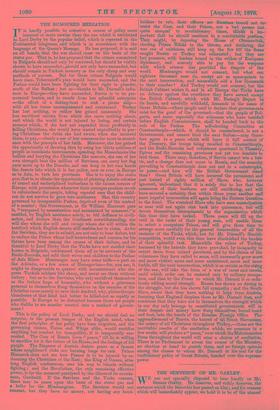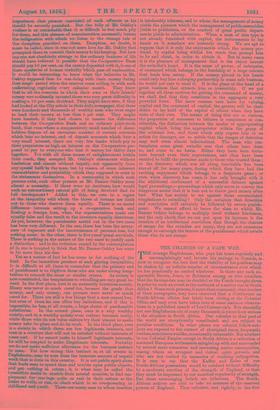THE SENTENCE ON MR. OAKLEY 'N ATE are not specially
disposed to bear hardly on Mr. Banner Oakley. He deserves, and richly deserves, the sentence which the Recorder has passed on him; and for reasons which will immediately appear, we hold it to be of the utmost importance that persons convicted of such offences as his should be severely punished. But the folly of Mr. Oakley's victims is so remarkable that it is difficult to feel much pity for them, and this absence of commiseration necessarily lessens the indignation with which we listen to the strange tale of the deception practised on them. Deception, no doubt, it must be called, since it was not mere love for Mr. Oakley that prompted them to commit their money to his keeping. But how any one not absolutely strange to the ordinary business of life should have believed it possible that the Co-operative Bank should pay 18 per cent, on the money deposited with it, is one of those mysteries of human credulity which pass all explanation. It would be interesting to know what the believers in Mr. Oakley supposed that he was doing with their money during that magic period when the interest came rolling in with such undeviating regularity every calendar month. They knew that in all the concerns in which their own or their friends' money was ordinarily invested there was very great difficulty in making a 10 per cent. dividend. They might have seen, if they had looked at the City article in their daily newspaper, that there were hundreds and thousands of wealthy men who were eager to lend their money at less than 5 per cent. They might have learned, if they had chosen to master the difference between the Co-operative Bank and an ordinary joint-stock bank, that even where a comparatively small number of share- holders dispose of an enormous number of current accounts which bear no interest, and of deposit accounts which bear a very small interest, there are very few banks which pay to their proprietors as high an interest as the Co-operative pro- posed to pay to everyone who lent it money for thirty days together. Yet with all these means of enlightenment within their reach, they accepted Mr. Oakley's statements without hesitation and almost without inquiry, not apparently from any special faith in the man, but by reason of some inherent reasonableness and probability which they supposed to exist in the statements themselves. In a community in which such persons exist, such other persons as Mr. Banner Oakley seem almost a necessity. If there were no deceivers, how would such an extraordinary natural gift of being deceived find its full development ? Added to this, we own to a regret at the inequality with which the blows of fortune are dealt out to those who deserve them equally. There is no moral difference between setting up a co-operative bank and floating a foreign loan, when the representations made are equally false and the result to the investors equally disastrous. As yet, however, the punishment meted out in the two cases has been very different. In the one, there has been the annoy- ance of exposure and the inconvenience of personal loss, but nothing more; in the other, there is five years' penal servitude. There is nothing in the nature of the two cases to justify such a distinction ; and in the irritation caused by the contemplation of it, one is tempted to think that Mr. Banner Oakley has come in for more than his due.
Yet as a matter of fact he has come in for nothing of the kind. In the immediate presence of such glaring inequalities, it is difficult at all times to remember that the primary end of punishment is to frighten those who are under strong temp- tations to commit the same or similar crimes. As society is now constituted, the temptations to swindling are very great in- deed. In the first place, ours is an eminently luxurious society. Money was never so much cared for, because the goods that money, and only money, can procure were never so much cared for. There are still a few things that a man cannot buy, but even of these he can often buy imitations, and if this is impossible, he has, at all events, a large choice of purchasable substitutes. In the second place, ours is a very wealthy society, and in a wealthy society even culture becomes costly, while those who do not value culture try their utmost to make money take its place and do its work. In the third place, ours is a society in which there are few legitimate interests, and man is a creature that will not be satisfied without interests of some sort. If he cannot make to himself legitimate interests, he will be tempted to make illegitimate interests. Probably we-do not make sufficient allowance for the business instinct in man. Yet how strong this instinct is, at all events in Englishmen, may be seen from the immense amount of unpaid woik that is done in this country. It is not public spirit alone that leads men to spend time and trouble upon public objects, and get nothing in return ; it is what may be called the irresistible desire to stretch their mental muscles, to find em- ployment for cravings quite as real in their nature as the desire to walk, or run, or climb which is so Overpowering in childhood and youth. There are many men to whom inaction is intolerably irksome, and to whom the management of money yields the pleasure which the management of public assemblies yields to politicians, or the conduct of great public depart- ments yields to administrators. When a man of this type is not already furnished -with capital, the inducements to lay hands on it somehow are intensely strong. We are apt to suppose that it is only the enjoyments which the money pro- duced by capital bring within his reach that prompt him to lie and cheat, in order to obtain it. But in many cases it is the pleasure of management that is the object nearest the swindler's heart. It is the sense of power, of enterprise, of command which belongs to the headship of a large concern that leads him astray. If the money placed in his hands could only buy him a sleeping partnership in some safe business, he would not care to steal it. It is the place at the head of a great business that attracts him so irresistibly. If we put together all these motives for getting the command of money, we shall find that they constitute in the aggregate a very powerful force. The more reasons men have for valuing. capital and the command of capital, the greater will be their desire to lay hold of the capital of others when they have none of their own. The means of doing this are so various, the proportion of successes to failures is sometimes so con- siderable, the distinction between the modes of appropriating capital which bring the appropriator within the grasp of the criminal law, and those which only expose him to an action for damages, are so subtle that the danger of detection may well seem almost infinitesimal. The man who con- templates some great swindle sees that othein have done so, and come to no harm. Either they have been fortu- nate beyond even their expectations, and thus have been enabled to fulfil the promises made to those who trusted them ; or the discovery which was all along inevitable has been staved off for many years, during which they have had the exciting enjoyment which belongs to a desperate game ; or even when discovery has come, it has only brought with it the additional excitement of a successful defence against legal proceedings,—proceedings which only serve to convey the dangerous moral that it is best not to throw good money after bad. What has society to set against these accumulated temptations to swindling? Only the certainty that detection and conviction will certainly be followed by severe punish- ment. We cannot afford to leave the class to which Mr. Banner Oakley belongs to multiply itself without hindrance, and the only check that we can put upon its increase is the creation of an intellectual conviction that though the chances of escape for the swindler are many, they are not numerous enough to outweigh the terrors of the punishment which awaits those who do not escape.































 Previous page
Previous page